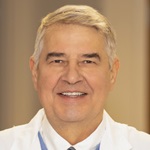Don’t Let GERD Get You Down

Answer a few questions and we'll provide you with a list of primary care providers that best fit your needs.
It’s never a good feeling to be woken up in the middle of the night with a burning feeling in your chest and throat. Ugh – heartburn.
If you start to have heartburn a couple times a week and can sometimes even taste stomach fluid in the back of your mouth, you might have gastroesophageal reflux disease (GERD).
GERD happens when a muscle at the end of your esophagus doesn’t close right, and it lets your stomach contents leak back up.
“People eat and after eating, in one hour or two hours or anytime, they have this really uncomfortable feeling,” says surgeon Laszlo Toth, MD. “So, the acid comes up through the esophagus and gets down in the windpipe, and that can trigger an asthmatic condition.”
Your lifestyle – being overweight and the types of food you eat – is typically the main cause of GERD. Eating large meals and eating too close to bedtime can both cause GERD to act up also.
Treating And Managing GERD
Treating GERD can include a range of options from lifestyle changes to medications, and sometimes even surgery.
“The number one thing is lifestyle modification,” Dr. Toth says. “Like avoid huge meals. Avoid all the known triggers like chocolate, alcohol, caffeine, certain spices, even too much peppermint. Don’t eat anything up to three hours before going to bed.”
He also recommends sleeping with your head propped up higher with extra pillows. Lying flat can trigger GERD to act up.
Losing weight can also help reduce or eliminate symptoms of GERD.
In some cases, your primary care provider might prescribe medications that help make refluxed stomach acid not burn. Some examples of these medications include Prilosec, Prevacid, and Nexium.
Along with lifestyle changes, these medications are not something you should expect to use for a lifetime. They should just be used to help reset your system so it can work properly again without too much acid.
If lifestyle changes and medication don’t do the trick, surgery might end up the best option to treat your GERD.
“Surgical correction of the root cause of GERD has evolved over the years,” Dr. Toth says. “Now, we have surgical procedures that may require only a short hospital stay — one day — and even an outpatient procedure.”
Nissen fundoplication is oftentimes used for GERD surgery. In this procedure, part of the stomach is used to create a permanent valve around the esophagus to replace your defective lower esophageal valve that causes GERD.
The Nissen fundoplication is a minimally invasive procedure that uses small incisions (cuts), so recovery is often quicker than with open surgery. The surgeon uses a surgical robot to assist.
A newer procedure called LINX® may also be an option, Dr. Toth says. With LINX, an expandable magnetic device is placed around your defective lower esophageal valve. LINX results are comparable to the Nissen fundoplication, but LINX has fewer potential side effects and can be done as an outpatient procedure, he says.
“I truly believe and hope that GERD treatment will change in the coming years from symptom control to a correction of the underlying cause,” Dr. Toth says.
Answer a few questions and we'll provide you with a list of primary care providers that best fit your needs.
Source: National Institutes of Health; Laszlo Toth, MD, Gem City Surgeons





